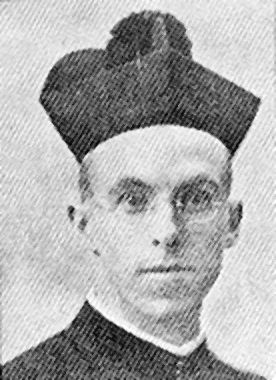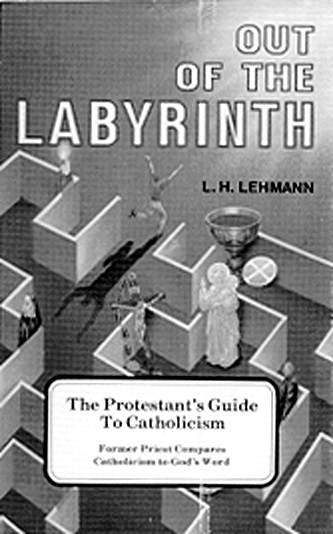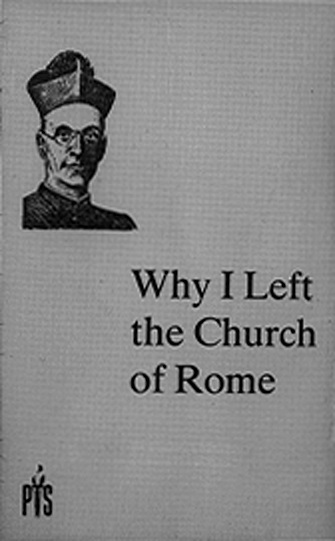The Soul of a Priest – Leo Lehmann

I have seen Roman Catholicism at work on three continents. I have ridden with cardinals in their luxurious limousines past the saluting Swiss Guards and through the Damascus Gate of the Vatican, leading to the Pontiff’s private apartments. I have watched while a pope died, saw him buried, and his successor elected and crowned. I stood beside the late Pope Pius XI while Pope Benedict XV made him a cardinal by placing the quaint pancake hat on his head, I myself holding up the long crimson train of another newly-made cardinal. I have ministered as a priest not only in magnificent cathedrals of Europe, but also in Dutch farmhouses on the wide African veldt and in tumbledown shacks of churches in the backwoods of Florida.
I was born in 1895 in Dublin. I have no joyous memories of my boyhood years. A sense of constant fear overshadowed everything. Fear is bound up with every act of religion with the priest…whether confession, attendance at Sunday Mass, what to eat on fasting days and days of abstinence, hell, heaven, purgatory, or death and the judgment of an angry God.
The Bible was a closed book to us in the classroom, in church, and in the home. We had not the money to buy a Catholic version, usually high-priced, and did not have the courage to accept a free Bible from a Protestant society. It was principally the fear connected with everything in the Roman Catholic religion that helped me with my decision to become a priest. I applied for admission and was accepted into the missionary college of Mungret, near Limerick.
Doubts
It was during my seminary years in Rome that doubt and distrust of the papal practice of Christianity first assailed me. Some of my thoughts at that time were: If Rome is the only center of the true faith, how is it that true religion is so lacking in its own citizens? Why so much atheism, indecency, lawlessness? Common courtesy was denied us from the Roman rabble as we passed along the streets; even the children of Rome shouted obscene insults at us. Also, why was there so much clamor for priests from Ireland and elsewhere to exile themselves in China, India, and Africa as missionaries of Papal propaganda, when Rome itself swarmed with ten thousand priests lolling lazily in the Vatican offices and scarcely finding sufficient altars in its four hundred churches to say Mass? Again, I asked myself why the boasted three hundred million (2005 estimates 1.117 billion) Catholics throughout the world should be represented in Rome by a body of cardinals nearly two-thirds of whom are Italians. Italy’s forty million people are Catholics in name only, and not at all religious minded. But the twenty million Catholics in the United States (2005 estimates 67 million) for instance, were not only faithful Mass-goers but contributed a lot of money to the coffers of the Vatican. Yet, only three Americans were allowed to be cardinals—mediocre but loyal servants of Rome, men who would never venture to express any disagreement with its dictates. I got to know of the intrigues among the ecclesiastics in Rome in order to gain the favor of those in power at the Vatican, of their greed for papal honors and advancement to high positions, for we found that there were bitter factions among high church dignitaries. Daily, I passed many landmarks of the subversive doings of greedy, ambitious warrior popes and their vile politics. There was a Castel di Sant’Angelo, or Hadrian’s Mole, with its walls scarred from the cannon of one pope in the Vatican fortress bombarding a rival pope defying his anathemas.
At last the day of my ordination came. It is a long, drawn-out ceremony. The countless rituals, the many prayers, and endless chantings bewildered me. My fingers were consecrated to say Mass and then wrapped in rich linen cloths. My head was anointed and likewise wrapped in linen bandages. I was given the golden chalice to touch. I was given the power to hear confessions and to forgive sin, to anoint the dying, and to bury the dead. For the first time, I tasted the wine from the Mass chalice, which, according to Catholic belief, I had just helped to transubstantiate into Christ’s blood by the formula of consecration. The ordaining prelate was Cardinal Basilio Pompilj, and the ceremony took place in St. John Lateran.
Repetitious Prayers
Any joy, which I experienced on that day, was offset by a sad incident, which I witnessed late that night. One of my companions became affected in his mind; for the strain of mechanical routine, innumerable petty restrictions, countless repetitions of prayers and formulas often unbalances the mind and brings on a species of religious madness called “scrupulosity.”
I remember another incident similar to this one. In Florida, as a priest, I used to visit an institution for feeble-minded children outside Gainesville. The doctor in charge brought me a Catholic girl about fourteen years old whose species of insanity consisted in feverishly repeating and counting “Hail Mary’s.” Her mind was deranged by the idea that she was obliged to say this prayer a hundred times each day, and in order to make sure of having them said on time, she was over a thousand ahead. Some priest, doubtless, had imposed the saying of these “Hail Mary’s” as a penance in confession.
After three years and a half of working as a priest in South Africa, I was recalled to Rome in order to work in the Vatican. As time went by, doubts kept recurring to me concerning the origins of the papacy. Growing distrust of Catholic practice as truly Christian, intimate knowledge of the wrecked lives of my brother-priests, and a waning hope of any possibility of Christian church betterment under papal supremacy had already caused me grave disquiet. Spiritually, doctrinally, juridically, and personally, the Roman papacy, as the divinely appointed guardian of Christianity, was rapidly crumbling to pieces within me. I was faced with the bitter realization that I must completely break with it if I were to retain my faith in Christianity.
From Rome I was transferred to America. New as I was in this strange country, I thought to save myself from total disillusionment by taking a keen interest in the humble work of ministering to the spiritual needs of the simple people.
A Boy Condemned to Die
One instance will illustrate the sense of failure that I experienced. Once I had the sad ordeal of assisting a young man condemned to die in the electric chair in the Florida State prison at Raiford, which came within the confines of my parish in Gainesville. He was from a city in the East, born and baptized a Roman Catholic and a product of a Roman Catholic parochial school. In his youth he was taught all the Roman Catholic practices deemed essential for a God-fearing life. He was convicted in Tampa as accessory to first-degree murder during the hold-up of a restaurant in which the proprietor was slain. I did all I could to prepare this young man for the “last mile.” I administered to him in full every rite that the Roman Church has ordained and by which divine grace and strength are said to be poured into needy souls. Even as he lay limp and dead in the electric chair the moment after the fatal current had done its work, I anointed his forehead with oil as prescribed for the administration of the sacrament of “extreme unction.” Yet, I knew I had failed to carry any real consolation to the sin-scarred soul of that poor lad.
I had visited him in his death cell during his week of fearful waiting and signed with him the form of absolution many times over. On that last morning I was at the prison gates at the break of dawn, carrying with me all the cumbrous instruments necessary to celebrate Mass. These I arranged on a table near the double bars of his cage. I donned all my shining Mass vestments and proceeded, with all the dignity that the ominous atmosphere of a condemned cell would permit, to offer the “sacrifice” of the Mass in full. The poor lad, in a fever-dread expectation, paced up and down behind the bars smoking one cigarette after another. He threw away a cigarette to receive on his tongue the wafer of Holy Communion, which I passed to him through the bars of his cell. It produced no effect. The injection of morphine administered by the doctor ten minutes before he was led to the chair calmed him somewhat. It suddenly dawned upon me that the doctor’s single injection of morphine had brought the boy more external relief than all my administrations of the Roman Catholic sacraments, which are believed to soothe both body and soul. We followed him to the chair.
The Electric Chair
As the full force of the destructive current went through the boy’s body, jerking it up violently and holding it tense and stiffened almost in the air, my hand went up and down in repeated signs of the cross, accompanied by the Latin words of absolution, as if I, too, could send a current of absolving grace through to his departing soul. His body fell limp and dead when the current had ceased, and I stepped forward with my vial of oil poised in my fingers. I requested the warden to remove the iron cap from the dead boy’s head and smeared his forehead, damp with the dew of death, with the oil used in the last rite of the Roman church. Since none of his relatives were there, I claimed this body and had it buried with full Church rites in the Roman Catholic part of the cemetery…though not without protest on the part of some pious Catholics in my congregation who objected to a convicted murderer resting among their departed relatives. I had to remind them that Jesus Christ died between two murderous thieves.
Yet, I confess that in spite of all this elaborate working of the power of Roman Catholic sacramental rites through my consecrated fingers, I felt that I had failed the poor lad in his most needful hour. It may as well have all been my fault; I had nothing of any real worth to give him, it all seemed empty and pathetic. Nevertheless, I had to accept the praise of Catholic people for having apparently succeeded in doing a true priest’s work for the poor condemned boy.
All this ritualistic maneuvering has been invented by the Roman theologians to fit in with their basic teaching that salvation can only be gained by “the works that are worked” by a priest. The grace of salvation is taught as something that can be “poured” into one’s soul through the specially devised channels of the seven sacraments. These in turn are supposed to act as conduits from the great reservoir of grace over which the pope in Rome has sole monopoly. This engineering of external unrealities, to act with magical force to produce a spiritual effect, runs through the entire system of Roman Catholic theology. The works of a priest’s hands must be accepted both as a matter of belief as well as of organization and practice. But of such is not the power of the kingdom of heaven. Paul the apostle declares the true power of the gospel. “For I am not ashamed of the gospel of Christ: for it is the power of God unto salvation to every one that believeth; to the Jew first, and also to the Greek. For therein is the righteousness of God revealed from faith to faith: as it is written, The just shall live by faith” (Romans 1:16-17).
Along the difficult path from the church of my childhood and its priesthood I had to travel alone, without any human guidance or sympathy. Jesus Christ was my only companion and guide. Resolutely, I grasped His outstretched hand and followed whither He led.
After I broke free from Romanism, the Lord Jesus revealed Himself to me as a personal Savior, through reading God’s Word. I saw the many errors of Roman Catholicism. From my sacerdotal eminence, I had to come tumbling down upon my knees to confess that, like all other men, I myself was a sinner needing to be saved by the Lord Jesus Christ.
Leaving Rome
On my path away from Rome, I passed some of these men racing towards it; others already within its gates were loudly trumpeting the false glories of Roman Catholicism. They were facing that upon which I had turned my back. The religious system that had disillusioned me, not only as a member but as an official of it, was becoming or had fully become their illusion. Happily I remained convinced that what was a cowardly retreat for them was advance for me. Nor did I stumble on my way because of the knowledge, that whereas they would be proclaimed as spiritual heroes by powerful Roman Church propagandists, I would have to suffer the effects of their bitter persecution and repudiation.
Unlike Cardinal Newman, Chesterton, and those others, my conversion was not to escape the alternative of an insane asylum but to attain spiritual sanity. On the mental borderline outside the logic of the wordy speculations of Roman church dogmatisms, as well as of all religious free-thought organizations, I knew I would find the reality of Christ. I saw, without argument, why Christ had condemned in no uncertain terms all church systems like the Roman papacy by holding up to ridicule the Jewish church of His own time.
Laying Down the Burden
I could see a difference in name only between the church of the Roman papacy and that which Christ so mercilessly belabored, i.e., the church of pontifical high-priests, of pompous dignitaries with broad phylacteries, of myopic scribes and whitewashed Pharisees, the church which “bind heavy burdens and grievous to be borne, and lay them on men’s shoulders; but they themselves will not move them with one of their fingers.” (Matthew 23:4), which legislates much about fastings and external washings, which makes sinful the meats that go into the belly on certain days, but heeds little the foul things that come out of the heart every day. If it might not be given to me to imitate Christ in His extreme condemnation of such a church, I felt that I would be one with Him by my silent protest in relinquishing my official position as a member of its ministering priesthood.


Over against the fearful conditions arrogantly laid down by the papacy as essential for salvation, I place the sweet, simple invitation of Jesus Christ in Matthew 11:28-30: “Come unto me, all ye that labour and are heavy laden, and I will give you rest. Take my yoke upon you, and learn of me; for I am meek and lowly in heart: and ye shall find rest unto your souls. For my yoke is easy, and my burden is light.”
“This then is the message which we have heard of him, and declare unto you, that God is light, and in him is no darkness at all. If we say that we have fellowship with him, and walk in darkness, we lie, and do not the truth: But if we walk in the light, as he is in the light, we have fellowship one with another, and the blood of Jesus Christ his Son cleanseth us from all sin” (I John 1:5-7).


